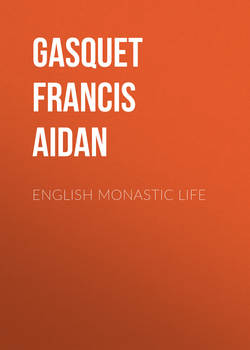Читать книгу English Monastic Life - Gasquet Francis Aidan - Страница 11
CHAPTER II
THE MATERIAL PARTS OF A MONASTERY
8. THE GUEST-HOUSE
ОглавлениеThe guest-house (hostellary, hostry, etc.) was a necessary part of every great religious house. It was presided over by a senior monk, whose duty it was to keep the hall and chambers ready for the reception of guests, and to be ever prepared to receive those who came to ask for hospitality. Naturally the guest-house was situated where it would be least likely to interfere with the privacy of the monastery. The guest-place at Canterbury was of great size, measuring forty feet broad by a hundred and fifty feet long. The main building was a big hall, resembling a church with columns, having on each side bedrooms or cubicles leading out of it. In the thirteenth century John de Hertford, abbot of St. Alban’s, built a noble hall for the use of guests frequenting his abbey, with an inner parlour having a fireplace in it, and many chambers arranged for the use of various kinds of guests. It had also a pro-aula, or reception-room, in which the guest-master first received the pilgrim or traveller, before conducting him to the church, or arranging for a reception corresponding to his rank and position.
In the greater monastic establishments there were frequently several places for the reception of guests. The abbot, or superior, had rooms to accommodate distinguished or honoured guests and benefactors of the establishment. The cellarer’s department, too, frequently had to entertain merchants and others who came upon business of the house: a third shelter was provided near the gate of the monastery for the poorer folk, and a fourth for the monks of other religious houses, who had their meals in the common refectory, and joined in many of the exercises of the community.
The Rites of Durham thus describes the guest-house which the author remembered in the great cathedral monastery of the North: —
“There was a famous house of hospitality, called the Guest Hall, within the Abbey garth of Durham, on the west side, towards the water, the Terrar of the house being master thereof, as one appointed to give entertainment to all states, both noble, gentle, and whatsoever degree that came thither as strangers, their entertainment not being inferior to any place in England, both for the goodness of their diet, the sweet and dainty furniture of their lodgings, and generally all things necessary for travellers. And, withal, this entertainment continuing, (the monks) not willing or commanding any man to depart, upon his honest and good behaviour. This hall is a goodly, brave place, much like unto the body of a church, with very fair pillars supporting it on either side, and in the midst of the hall a most large range for the fire. The chambers and lodgings belonging to it were sweetly kept and so richly furnished that they were not unpleasant to lie in, especially one chamber called the ‘king’s chamber,’ deserving that name, in that the king himself might very well have lain in it, for the princely linen thereof… The prior (whose hospitality was such as that there needed no guest-hall, but that they (the Convent) were desirous to abound in all liberal and free almsgiving) did keep a most honourable house and very noble entertainment, being attended upon both with gentlemen and yeomen, of the best in the country, as the honourable service of his house deserved no less. The benevolence thereof, with the relief and alms of the whole Convent, was always open and free, not only to the poor of the city of Durham, but to all the poor people of the country besides.”
In most monastic statutes, the time during which a visitor was to be allowed free hospitality was not unlimited, as, according to the recollection of the author of the Rites of Durham, appears to have been the case in that monastery. The usual period was apparently two days and nights, and in ordinary cases after dinner on the third day the guest was expected to take his departure. If for any reason a visitor desired to prolong his stay, permission had to be obtained from the superior by the guest-master. Unless prevented by sickness, after that time the guest had to rise for Matins, and otherwise follow the exercises of the community. With the Franciscans, a visitor who asked for hospitality from the convent beyond three days, had to beg pardon in the conventual chapter before he departed for his excessive demand upon the hospitality of the house.
